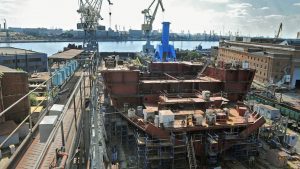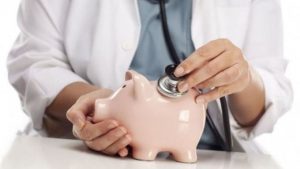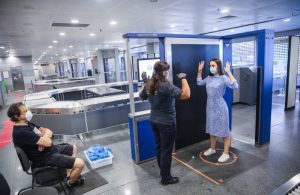
The industrial community of Ukraine is against ordering 16 modern Mark VI patrol boats and the equipment they need for $600 million from the United States, the press service of the Ukrainian League of Industrialists and Entrepreneurs (ULIE) has said.
“The main duty of the authorities is to take care of the economic development of their own country, filling their own state budget, creating jobs at home. The orders in question only contribute to the growth of foreign budgets and stabilize the situation with employment in other states and do not help overcome crisis in our country. This is unacceptable and irresponsible,” the ULIE President, the chairman of the Anti-Crisis Council of Public Organizations, Anatoliy Kinakh, said.
In addition to ordering boats, industrialists pay attention to the purchase of imported locomotives and helicopters, which, in their opinion, could threaten serious socio-economic consequences for the whole country.
Kinakh emphasized that Ukraine has its own shipbuilding industry – highly professional production facilities, including in Mykolaiv, which are capable of building modern military boats and other small tonnage ships with a certain modernization.
“At this difficult time, the responsible government must develop both a national strategy for industrial and innovative development, and separate programs for shipbuilding, other priority areas of industry, to use all the levers to support the complex high-tech industry, starting from manufacturers’ access to credit resources, mitigating fiscal burden, changes in public procurement that would allow attracting public finances to load national producers,” he said.

Commodity turnover in the main retail segments returned to the pre-crisis level according to the results of May 2020, almost reaching the February figures, according to the analysis of the number and volume of payments by credit cards in the network of POS terminals of PrivatBank (Kyiv) in January-May 2020, published by the bank’s press service on Monday.
“Food retail is currently getting out the lockdown without losses. According to the analysis of the volume of payments made by cards in the bank’s retail network of terminals, in March and April 2020, non-cash turnover in food chain stores increased by 25% compared to February. In May, non-cash turnover in the food networks was 23% higher than in February,” the bank said.
Non-cash turnover in the network of pharmacies and medical goods stores increased most of all in the first months of lockdown, in particular, in March compared with February it increased by 30%. At the same time, in May non-cash turnover in the pharmacy chains fell by 18% compared to February.
According to the analysis, the most significant during the lockdown was the reduction of cashless turnover in the electronics and home appliances market, which in March amounted to 10% compared to February, and in April reached 43%. In May, the turnover in this sector returned to the pre-crisis level.
According to PrivatBank, by the end of May, the turnover in filling station chains also returned to the pre-lockdown level after sales fell by 20% in April compared to February.

The Cabinet of Ministers of Ukraine at an extraordinary meeting on June 19 approved a resolution according to which, starting from September 1, 2020, it will increase wages for health sector workers.
“The wages of doctors is one of the lowest in Ukraine, which is unacceptable, especially in the conditions of a worsening epidemic. The draft act proposes, starting July 1, 2020, the establishments of raises to wages for medical and other employees of medical institutions – doctors in the amount of 70% of the official wage, for specialists with basic higher and incomplete higher medical education in the amount of 50% of the minimum wage, to junior medical staff in the amount of 25% of the minimum wage,” Minister of Health Maksym Stepanov said.
“We will raise payments to all doctors in total by the amount of almost UAH 8 billion,” Prime Minister Denys Shmyhal said

Foreigners entering Ukraine should have an insurance policy covering COVID-19 treatment, Ukraine’s Minister of Health Maksym Stepanov has said.”We are talking about a usual voluntary medical insurance policy. It is very important for us that the person who comes to Ukraine, who is not a citizen of Ukraine and not a refugee, must have a policy that covers exactly the COVID-19 treatment,” he said at a briefing in Kyiv.
The minister explained that according to the law, the state covers treatment only to citizens of Ukraine or refugees who are in the territory of Ukraine